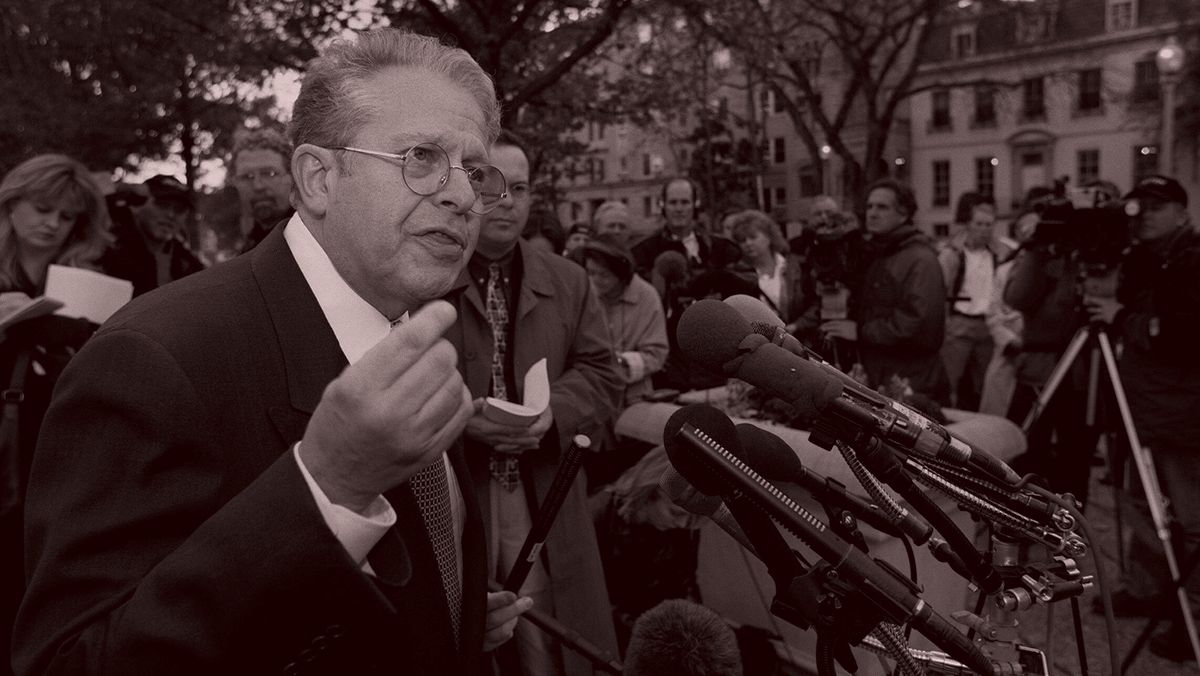Welcome back to The Best & The Brightest. I’m Abby
Livingston.
As Washington contemplates an emerging constitutional clash between the White House and the courts, I’m grateful to share my partner John Heilemann’s engrossing interview with Harvard Law professor Laurence Tribe. As John notes, Tribe is a 36-time litigator before the Supreme
Court, and has served as a legal tutor to a staggering number of political and judicial eminences across the ideological spectrum. So when he speaks out on the separation of powers, it’s worth a listen.
Also in tonight’s issue, I’m excited to share an excerpt from the legendary Hollywood reporter Kim Masters—our newest Puck partner and contributor to the
What I’m Hearing franchise. For decades, I’ve been one of Kim’s most loyal readers, in part because she understands personalities and power better than most full-time political reporters. Read on for some killer reporting on how Melania Trump resurrected the career of #MeToo’d Hollywood director Brett Ratner.
But first, a few notes on the early Stefanik election smoke signals…
|
The race to replace Republican Rep. Elise Stefanik’s seat in upstate
New York could not be better timed for political junkies. She’s still in office, of course, but it’s a matter of time until she’s confirmed as ambassador to the United Nations. Although no one’s predicting an upset this spring, political observers will be focused on the margin, and what kind of trouble it portends for Republicans in the midterms.
The special election will probably take place in
April, by which point we could be in the midst of a prolonged government shutdown and a looming national default. Tariffs could be slamming New York’s farmers, and the average American could be feeling the downstream effects of Elon’s sweeping DOGE cuts, if they’re implemented. Meanwhile, SALT will be the controversy in New York as Capitol Hill Republicans sort through the tax cuts bill. Stefanik’s strength as an incumbent is unquestioned; she won reelection 62
percent to 38 percent, and 24 points is a huge buffer for any Republican running to succeed her. But that’s also the exact margin by which former Rep. Tom Price of Georgia won his 2016 reelection. After Trump appointed Price to the cabinet, Democratic unknown Jon Ossoff started to gain traction in his district. Ossoff ended up losing the race to succeed Price by a mere four points—a shockingly narrow margin for what had been considered a safe Republican
seat—ultimately foreshadowing the 2018 Democratic midterm wave.
Sure, it’s not a perfect comparison. On election night 2016, it was apparent the suburbs were moving toward the Democrats, despite Hillary Clinton’s loss. Price’s district, a suburban one outside Atlanta, exemplified that pattern. On the other hand, there were no silver linings for Dems in 2024, and it was an especially rough night in
rural districts like New York’s 21st. So while Democrats are not counting on this special election to minimize Mike Johnson’s House margin, the question for now is whether they will lose less badly—and whether that’s a step in the flailing party’s journey back to some semblance of confidence.
|
|
|
Open source AI is available to all, not just the few.
In this job market, how are you standing out in a sea of resumes?
The solution: “With Llama, Meta’s free open source AI model, we built an AI tool that helps candidates write resumes and more—like a personal career coach,” says CEO Mitchell.
Learn more about how others are building with open source AI.
|
|
|
And now, fresh reporting on Amazon’s $40 million Melania doc from Kim…
|
|
|

|
Kim Masters
|
|
The Courtship of Brett & Melania
|
“I thought I was being punked,” a veteran agent told me after
hearing the news that Amazon had agreed to pay an eight-figure tribute to license a Melania Trump documentary directed by the canceled filmmaker Brett Ratner. That agent was hardly the only one in shock. First, there was the price tag, as reported by my partner Matt Belloni. “$40 million? That’s absurd. Maybe
$5 million,” an executive who has experience in the documentary space told me. The general assumption was that Jeff Bezos, the Amazon founder, had discovered yet another avenue to work his way into Donald Trump’s deepest (and most crowded) orifice, weeks after pulling The Washington Post’s endorsement of Kamala Harris and earning a prized seat on oligarch’s row at the inauguration.
The truly baffling question was how Ratner had been welcomed into the project and, literally, the White House. The director, who rose to prominence via the Rush Hour movies and directed sequels to franchises as varied as X-Men and The Silence of the Lambs, had been trying, and failing, to get himself uncanceled since the Los Angeles Times
published an exposé, in 2017, in which six women accused him of sexual misconduct. (Through his attorney at the time, Marty Singer, Ratner “categorically” denied the allegations, and he was never charged.)
Ratner
has long rolled in eyebrow-raising circles: Among others, he’d been tight with the music mogul Russell Simmons, who has faced multiple rape accusations (Simmons has denied the allegations against him), and oligarch Roman Abramovich. In 2022, Abramovich issued a denial following a report
alleging that he’d asked Ratner to loan him money after his assets in the U.K. and the U.S. were seized in response to Russia’s invasion of Ukraine.
Ratner also has deep connections to people who matter in Trumpworld. Starting in 2013, for instance, he was partners in RatPac-Dune Entertainment, a film finance/production company, with Steven Mnuchin, who subsequently became Treasury secretary during Trump I. He then partnered with Len Blavatnik, the owner of Warner Music Group and a political donor whose contributions to G.O.P. candidates suddenly accelerated in 2015. (Small world: In the
1990s, Blavatnik, a Ukraine-born American citizen, had been in business with oligarch Oleg Deripaska. In 2019, Mnuchin faced hell from congressional Dems for his plan to lift sanctions on Deripaska.)
Ratner appears to have been the first and only
choice to direct the Melania film—though, in fairness, how many respected directors would want to make a documentary controlled by this particular subject? By mid-December, a source involved in the bidding for the project told me that Ratner had been installed in an eight-bedroom house at Mar-a-Lago as Melania’s guest. He hadn’t even met her yet, this source said. (Ratner did not respond to a request for comment.)
Melania told Fox News that the doc offers a look at her life “from transition team to moving to the White House, packing, establishing my team, the first-lady office, moving into the White House…” Her early life and career apparently will not be covered extensively or at all. A source with knowledge of the situation told me that Ratner shot for more than 30 days and had such unfettered access to the White House that Secret Service agents were said to be uneasy.
Unsurprisingly, I’m told Elon Musk is a presence in the film, too. (The White House declined to comment.)
At this point, filming on the Melania doc has wrapped. Her reps insisted on a theatrical release, which insiders say will be brief and limited. The film will stream on Amazon Prime Video and then will be expanded into a separate three- or four-part docuseries. There are rumors that
Ratner may also be making an additional film about Trump. (Amazon declined to comment.)
Continue reading online…
|
|
|
A sobering conversation with Laurence Tribe, the esteemed legal scholar, about the
separation of powers, crossing the Rubicon, and the definition of a coup.
|
|
|
Donald Trump’s second presidential term, while different from his first
in many ways, has remained perfectly consistent in one glaring respect: His behavior during his first three weeks back has once again served as a full-employment act for legal analysts—from law school heavyweights and white shoe partners to former federal prosecutors and public defenders—who have been called back into 24/7 service to guide the rest of us through the thicket of obscure, arcane, and often unprecedented legal issues that Trump’s White House modus vivendi tends to place at
the center of our politics. Still haunted by your first encounter with the Emoluments Clause circa 2017? Just wait until you get a load of the Impoundment Control Act, bub.
Difficult as it might be to imagine when it comes to a president who was impeached twice in his first term, Trump’s recent statutory and constitutional controversies—along with those of Elon Musk and his team of manic DOGE-bags (credit
where it’s due to Pod Save America’s Jon Favreau for that coinage)—have been of a more foundational nature than those raised during his first term. What practical limits to the power of the executive branch actually exist? What happens if Congress—or more specifically, its bicameral Republican majority—is willing, or even eager, to forfeit the constitutional duties bestowed on it? What happens if (or, more likely, when) the new administration is
enjoined from this or that action by federal court order—and responds by telling the court to go pound sand?
|
|
|
Open source AI is available to all, not just the few.
Studies show it takes hundreds of days to match patients with a clinical trial.
The solution: “We used Meta’s free open source AI model, Llama, to build an AI tool that helps match patients to clinical trials in a day,” says Dr. Salloum.
Learn more about how others are building with open source AI.
|
|
|
These were some of the questions I had the other day when I sat down for my Impolitic podcast
with the professor who has taught me much of what I know about constitutional law: Laurence Tribe, one of Harvard Law’s most revered titans from 1968 until 2020 (now professor emeritus and occupant of a cushy endowed chair), and author of the magisterial multi-volume treatise American Constitutional Law, first published in 1978 and still taught in virtually every law school in America. Not incidentally, Tribe is also a 36-time litigator before the Supreme Court, and has
served as a legal tutor to a staggering number of political and judicial eminences across the ideological spectrum, from Barack Obama and Elena Kagan to John Roberts and Ted Cruz. In our conversation, Tribe contended that the courts—including the Supremes, despite their diminished reputation and recent tendency toward overt partisanship—remain the best and possibly only remaining guardrail protecting our democracy from a slew of
existential depredations being inflicted on it by Trump. A condensed and lightly edited excerpt of our talk follows.
|
John Heilemann: Yale historian and scholar of
authoritarianism Timothy Snyder wrote the other day, about what Team Trump is doing, “Of course it’s a coup.” Do you agree?
Laurence Tribe: I think it is obviously a coup, an inside coup, and not only by people in power who are now consolidating their power, but by people who were never elected to power. It has to be called a coup because it meets all the criteria; it is an
attempt to use the instruments of power to displace the entire structure of government that we have nurtured and inherited over two centuries. And it’s happening at blinding speed, so it’s very hard to see exactly where it’s going.
One of the surprising things is that it’s happening so quickly and with so little systematic planning that it is quite possible that it will collapse on itself. Courts, one
after another, are going to strike this stuff down; we see it all the time. The legal questions are easy, and that’s one of the things that makes the situation so strange. It’s not as though there are exotic, difficult legal questions. I think there’s a good chance that even the handpicked Supreme Court that Trump is counting on to allow these things to go forward will say, No, that’s a bridge too far. And then what? That’ll be a fork in the road. On one hand, Trump may dismiss anything
the courts say. And because, thanks partly to him, the courts have lost lots of their credibility, it may be that Trump can get away with that, and that will mean that we really don’t have a legal system anymore. On the other hand, he [could] obey the courts, blame them, and say that they’re part of what we have to displace. Either way, it’s going to be chaos.
What do you say to those who say
that talk of coups, at least at this stage, is little more than liberal hyperbolizing, catastrophizing, or both?
You have to define what you think the United States of America is. Is it whatever happens as a result of an election, as long as people are warned? Or is it something that has certain structural characteristics? It’s not important what label you give it. What [is happening] is a complete tossing aside of
our whole country, our government. Yes, it’s true that people voted for Donald Trump, and it’s true that he warned people through Project 2025 and occasional statements about how he would terminate the Constitution if necessary. In a sense, you could say we got what we asked for. But it doesn’t mean that it’s not a radical, revolutionary scrapping of the whole system. Talk about impeachable offenses—virtually everything that has happened since he was inaugurated the second time is an impeachable
offense.
|
|
|
Until recently, in all my years covering Congress, one thing I rarely saw from
either party was a willingness to give up their institutional and/or constitutional prerogatives—in particular those that endowed them with power, such as the power of the purse. The one thing the two parties vehemently agreed on was their aversion to even a hint of deference, let alone subjugation, to the executive branch. Then along came Trump.
I hate to sound partisan, but I do think almost all of the Democrats
in the House and Senate still value the idea of an independent Congress. I’ve come to think that, almost with no exceptions, the Republicans are no longer an actual political party. They’ve become a cult. If they were a political party, they would feel concerned about the institution that gives them authority suddenly groveling and subjugating itself, as you say, to one of the branches. Instead, it looks like all they care about is not offending Trump, and especially Musk.
|
On a number of fronts, the Trump administration has issued orders that most
lawyers will tell you are clearly illegal or unconstitutional—where there’s simply no ambiguity. What’s your degree of confidence that the courts will hold the line in those cases?
We really should assess the centrality of the court. (Not the importance of having courts issue orders that get obeyed. I think that’s important to avoid complete chaos.) But
the direction in which the Constitution moves is determined by the court. The idea that the court is the last word has always been problematic, and I think we need, over time, to diminish its centrality. But I think it is still important that we avoid the kind of chaos in which power is all that matters, where if you’ve got money like Musk or power like Trump, you’ll get away with whatever you do.
When the
court says, If you’re the president, you won’t be punished criminally—that’s bad enough, because it really licenses presidents to go all out. But much worse would be saying, If you’re the president or acting on behalf of the president, nothing any judge says matters. So, I do think it’s important that the courts come through. I think they will in some areas. I think the federal courts—even the ones that are raised on Federalist Society mother’s milk—believe not only in the
unitary executive, but in a Congress that has the power of the purse. They’ve made it pretty clear in many cases that they take that seriously. It may be like an irresistible force meeting an immovable object, and when that happens, we don’t know which way the atoms will split. I think we can hope. But it will never be the case that the courts alone will save us. We have to save ourselves. It’s clear that elections matter.
It feels to me and a lot of experts like we are headed for a constitutional crisis, where at some point the Supreme Court, despite the perception of many that it’s in the tank for Trump, rules against the administration on some issue and Trump refuses to comply—essentially saying, “Okay, John Roberts, how many divisions have you got?” What happens then?
I
think the justices have so convinced themselves of their imperial role that they would basically think that the country would back them up. Whether they’re right, I don’t know. But what I don’t think they would do is say, Because we will not be obeyed, we will back down.
Do you agree we’re headed for that kind of crisis? Everything Trump is doing suggests that his belief in his own
authority is total, and he wants to test the proposition and see whether anyone or anything can hem him in. And the most obvious next stop on the testing circuit, if Republicans in Congress are going to continue to be supine, is SCOTUS.
The U.S. government had a pretty bad record under Trump before the court. When he was rebuffed by the Supreme Court, he didn’t hesitate to say, They’re wrong; they don’t know
what the hell they’re talking about. So I think he would say that, and he would say they’re exceeding their jurisdiction. His speechwriters would give him a way of saying that the court should be ignored. And that would be a major crisis.
|
|
|
Join Emmy Award-winning journalist Peter Hamby, along with the team of expert journalists at Puck, as they let you in on the
conversations insiders are having across the four corners of power in America: Wall Street, Washington, Silicon Valley, and Hollywood. Presented in partnership with Audacy, new episodes publish daily, Monday through Friday.
|
|
|
Unique and privileged insight into the private conversations taking place inside boardrooms and corner offices up and down
Wall Street, relayed by best-selling author, journalist, and former M&A senior banker William D. Cohan.
|
|
|
Need help? Review our FAQ page or contact us for assistance. For brand partnerships, email ads@puck.news.
You received this email because you signed up to receive emails from Puck, or as part of your Puck account associated with . To stop receiving this newsletter and/or manage all your email preferences,
click here.
|
Puck is published by Heat Media LLC. 107 Greenwich St, New York, NY 10006
|
|
|
|







_01JJSAGANEG0PC4SVHS7ZNQ6HX.jpg)

















